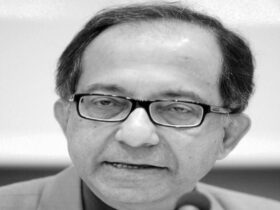- Hindi news
- Opinion
- Abhay Kumar Dubey’s Column Have We Paid Attention to the Questions of JP Movement?
5 days ago
- Copy link

Professor at Abhay Kumar Dubey, Ambedkar University, Delhi
The more condemned the emergency imposed by Indira Gandhi to save her chair in 1975. I, my father and my family have also been a victim of political oppression during the Emergency. But have we learned any lesson since the Emergency, our leaders and our democratic system?
The answer to this question goes beyond the tussle arising out of the experience of those who are jailed during the Emergency. We should not forget that the imposition of emergency came under the leadership of Jayaprakash Narayan due to the 1974 movement. There was a question of democratic political reforms in the heart of this movement. If we want today, we can understand this question in such a way that the agitating students and youth of that era were asking what should be our representative?
If he does not live up to the criteria of good representative, should the public not give the right to return his representative? Should not the codes that control political corruption in elections be formed? Should there not be internal democracy in parties? Shouldn’t there be institutional settlements to eradicate money and muscle power to get power? Should not the mobilization of votes on the basis of religion and caste not stop?
Even after the Emergency, the Congress has been in power for 19 years. The BJP has also suffered power for 17 years. Every type of regional party has gained power in some form or the center at some way or the other. Can any of these party today say that it has ever noticed the questions raised by the JP movement, or has created its manifesto on the basis of them?
What happened in reality is exactly the opposite of the words and feelings of that movement. The quality of Indian democracy has steadily declined in the last fifty years. In 1975, there was no doubt on the fairness of the opposition, the Election Commission and other statutory institutions. The main task of the journalist was to ask the power question, not that he was seen pushing the opposition into the corner, giving him a clean chit. Whatever figures of the economy were there, no one doubted them.
Except for the Emergency months, the process of law in Parliament was based on more democratic and healthy discussions. Claims to create opposition-free India were not openly made. Corporate capital was not seen controlling the structures of power. The parties did not do their organizational expansion through defections. More than a hundred crore would be spent in a Rajya Sabha election, it could not be imagined. Impressive people associated with politics will appear to be involved in criminal cases, it was also difficult to think.
Doesn’t it seem strange that people who jailed during the Emergency in this fierce era of all -round disturbing of democracy present themselves as the forearm of citizens and political rights? Those who were then in jail (whether they are journalists or leaders), have taken steps towards enriching democracy? The political history of the Emergency is also not correct from the factual point of view. Indira Gandhi was definitely unpopular in 1977, but only in North India. South also gave more than 150 seats to the Congress in that election. Despite being powerful, the Congress received 34.52% of the votes. That is, more than BJP’s victory in 2014.
Two and a half years after the Emergency, the Congress returned to power by winning 353 seats. It got 42.69% of the votes, which BJP has not received till date. So, did the people of the country really vote in 1977 after being angry with the snatching of civilians? Was that vote anti-emergency, or was his character just anti-sterilization? The Congress lost only in the areas where the Jabariyas sterilization program was run.
The widespread question related to this is whether the common people have their political liberations as much and the same way that we like to believe in principle? The truth is that no one learned a lesson from the Emergency. Neither did he have imposed, nor did he fight for the so -called second freedom. There is still a chance that in the light of the bitter experience of the Emergency, we start seriously thinking about writing our democratic code.
- There is still a chance that in the light of the bitter experience of emergency, we should start thinking about re -writing our democratic code. If we do not do this, then our democracy will be similar to a soulless body.
(These are the author’s own views)









Leave a Reply